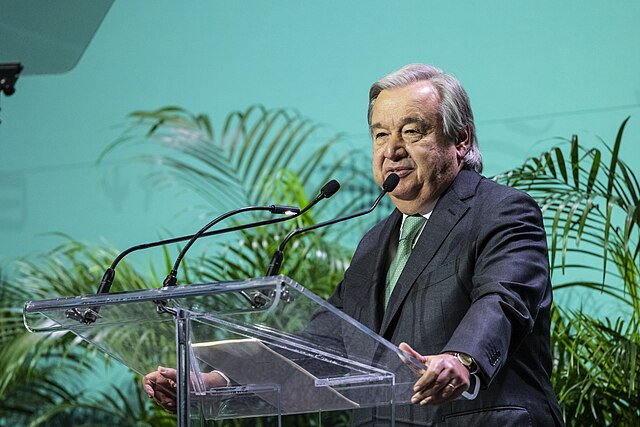United Nations Secretary-General António Guterres issued a stark warning to world leaders at the UN General Assembly on Tuesday, condemning the increasing number of governments and groups that act with impunity in conflict zones across the globe. Guterres cited the wars in Ukraine, Gaza, and Sudan as emblematic of a dangerous disregard for international law and the UN Charter, saying that too many actors now believe they are "entitled to a get out of jail free card."
"They can trample international law, they can violate the United Nations Charter, they can invade another country, lay waste to whole societies, or utterly disregard the welfare of their own people," Guterres declared in a speech aimed at galvanizing global action. "And nothing will happen. The level of impunity in the world is politically indefensible and morally intolerable."
His comments come as the conflict between Israel and Hamas in Gaza threatens to spill into Lebanon, with Israel launching strikes against Hezbollah targets in Beirut. Guterres warned that Lebanon, already teetering on the edge, could become "another Gaza" if diplomatic efforts fail. "Lebanon is at the brink," Guterres said. "The people of Lebanon, the people of Israel, and the people of the world cannot afford Lebanon to become another Gaza."
Guterres also addressed the war in Ukraine, which began with Russia's invasion in February 2022 and has continued to escalate. Kyiv recently launched a bold incursion into Russia's Kursk region, raising the stakes further. "Civilians are paying the price-in rising death tolls and shattered lives and communities," Guterres said, underscoring the urgent need for a peace rooted in the UN Charter and international law.
Sudan, where a brutal conflict erupted between the army and the paramilitary Rapid Support Forces in April, was another focal point of Guterres' speech. He warned of a "humanitarian catastrophe" unfolding in the country, as famine spreads and foreign powers interfere without a unified approach to peace. "Outside powers continue to interfere with no unified approach to finding peace," he lamented, adding that international efforts to resolve the Sudan crisis have been fragmented and ineffective.
Despite the bleak outlook, Guterres maintained that the global challenges are "solvable." However, he warned that deepening geopolitical divisions, unmitigated climate change, and unchecked nuclear posturing have pushed the world toward a dangerous "powder keg" scenario. "We are edging towards the unimaginable," Guterres cautioned. "A powder keg that risks engulfing the world."
In his address, Guterres previewed remarks from the "Summit of the Future," which took place earlier in the week. During the summit, he highlighted the broader failures of the international security system, including "geopolitical divides, nuclear posturing, and the development of new weapons." He also pointed to climate change and vast economic inequalities as contributors to the instability seen in various regions.
In the context of growing global conflict, U.S. President Joe Biden's appearance at the General Assembly carried particular weight, as it is likely his final major speech on this stage as president. U.S. Ambassador Linda Thomas-Greenfield said the U.S. would use the platform to focus on ending "the scourge of war." She noted that approximately two billion people live in conflict-affected areas, underscoring the need for global progress on peace efforts. "The most vulnerable around the world are counting on us to make progress, to make change, to bring about a sense of hope for them," she added.
Brazilian President Luiz Inácio Lula da Silva, Turkish President Recep Tayyip Erdogan, and Jordan's King Abdullah II also spoke on opening day, while Iranian President Masoud Pezeshkian took the stage amid heightened tensions in the Middle East. Pezeshkian accused Israel of seeking to drag Iran into a broader conflict and destabilizing the region. "It's Israel that wants to drag everyone into war and destabilize the region," he said, rejecting claims of Iranian aggression.
David Miliband, president of the International Rescue Committee, invoked the founding principles of the UN in his remarks. Quoting former U.S. President Harry Truman, Miliband urged world leaders to flip the equation from "might makes right" to "right makes might," calling on them to restore the moral authority of the UN Charter. "Almost 80 years later, we have seen the terrible consequences of the failure to flip this equation," Miliband said. "In contexts like Gaza, Sudan, and Ukraine, might is making right."
Miliband's remarks resonated as the General Assembly prepares for two high-profile speeches later this week. Palestinian President Mahmoud Abbas is set to address the Assembly on Thursday, followed by Israeli Prime Minister Benjamin Netanyahu. Both are expected to offer starkly contrasting views on the ongoing Gaza conflict and its wider regional implications.
Ukrainian President Volodymyr Zelenskyy, who has been a central figure at past General Assembly meetings, is also scheduled to speak twice this week, addressing both the Security Council and the General Assembly itself.
With the international spotlight on rising conflicts and deteriorating global security, Guterres called for a renewed commitment to multilateralism, urging leaders to not only agree on solutions but to take meaningful action. "We are here to bring multilateralism back from the brink," Guterres said. "The challenges are surmountable, but only if the international community unites to act."






